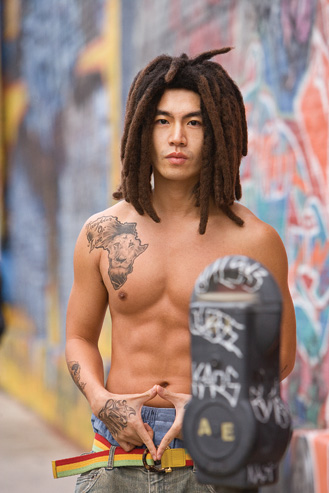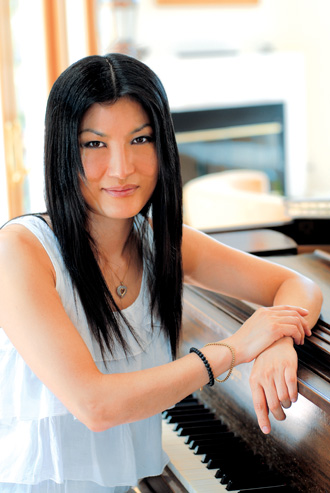By Michelle Woo
Framed photographs of hip-hop and reggae icons hang on the walls inside radio station studio Wild 98.7 in Tampa, Fla. In a bright sound booth, DJ Jah B dances around animatedly to a song by his next guest. “Skull! Skull!” he shouts from behind the turntables. “Yeah!”
The artist sits across from him, amused. Wearing a bright orange T-shirt and headphones that rest over his head of thick dreadlocks, he waits for his cue and then leans into the microphone: “Hey y’all. It’s your boy Skull. I just flew all the way from Korea to talk to you. Yeah, mon.” The deejays let out a loud “Whoooooo!”
The 27-year-old reggae artist from Seoul is on a whirlwind mission to make his musical mark in the U.S. Already, he’s creating a stir. His single “Boom Di Boom Di,” which debuted in June, hit the No. 4 spot on the Billboard Hot R&B/Hip Hop Single Sales chart and No. 17 on the Hot Singles Sales chart, the highest ranking ever for a Korean artist on the U.S. charts. His solo album will be released this month.
On this mini-tour in Florida, arranged by his manager, Morgan Carey, Skull is the opening act for reggae superstar Buju Banton in St. Petersburg and a special guest at The Marley’s Myspace Secret Show in Miami.
For Carey, these are high stakes moments. In a music scene rooted in Caribbean culture, Skull is quite a novelty. Will the reggae community embrace him? As Skull takes the mic and jams out a few verses, Carey anxiously watches the crowd for the answer.
“We’ve met some resistance,” Carey says. “At hip-hop clubs, there’ve been people who’ve yelled out, ‘Hey chink, get off the stage,’ or ‘Yo, n-gga. Where you from?’ But Skull’s not that guy who gets angry. He’s there for the music. He’s a true artist. He believes that his music can translate across color lines and it has.”
Skull, aka Cho Sung-jin, says he was a rebel growing up. While most of his peers were listening to K-pop, he would sneak away to underground hip-hop shows. One day, he was standing on the street near a record shop when he heard Bob Marley’s “Legend” album playing inside.
“I was captivated,” he says. “I just stood there ‘til it finished. It really touched my soul.”
From then on, Cho hunted down every reggae album he could find, which in Korea, were mostly bootleg copies. While listening to the tracks, he began mimicking the voices and developing his own raspy, Jamaican-inspired singing accent. Cho went on to perform at underground shows with a couple of short-lived bands (he kept the name of his first band, Skull) before forming the reggae and hip-hop duo Stony Skunk, which released three albums in Korea.
Meanwhile, Carey, who’s well-connected in the U.S. music industry (and Mariah Carey’s older brother), was handpicked by Korean music label YG Entertainment to scout new talent in Korea. He landed upon an underground show in Shibuya, where Stony Skunk was the warm-up band. When Skull took the stage, he was hooked.
“He was beautiful, comfortable and authentic,” Carey says. “I can recognize star appeal and thought that with the right push, we can make this happen.”
Skull decided to stick with Carey, taking a leave of absence from Chungang University, where he was studying advertising and public relations. Their goal was to successfully cross over to the United States. Carey devised a strategy. He wouldn’t promote Skull to Asian audiences, only to urban crowds. Too often, Carey says, when Asia-grown artists try to rise up in the States, they lock themselves in a niche market, never breaking into the mainstream.
Carey decided to take a song that Skull released in Korea and have it translated into English. The resulting single, “Boom Di Boom Di,” is an upbeat dancehall mix with lyrics like, “Me ready when you ready me they’ll be no need fa searching girl/ Me have de some fe you some yo me give you de working girl/ Tonight is the night they’ll be no hurting girl/ Me bring you de pleasure and that will be worth it girl.” When singing, Skull’s Korean accent goes undetected.
Jah B of Wild 98.7 hosted the Buju Banton show in Tampa and says he was amazed at the crowd’s roaring response. After his performance, girls started mobbing him.
“Skull is the future of Reggae,” Jah B says. “‘Boom Di Boom Di’ is hot … and I expect it to be in heavy rotation here by summer’s end.”
Carey says he’s focusing much of his efforts on grassroots marketing, plugging Skull’s music video on MySpace, college radio and reggae clubs. He’s hoping that Skull will soon collaborate with other big-name artists.
Throughout his years as a reggae artist, Skull has given himself a makeover with dreads, beaded jewelry — the works. This summer, on a trip to Jamaica, he met an old man who gave him an amulet engraved with a picture of a lion. The man told Skull that he was his brother. Skull had the picture of the lion tattooed across his chest.
Humble and calm, Skull seems genuinely appreciative about his success within the U.S. reggae scene. Still, he’s not looking for a permanent transition.
“I’ll perform anywhere,” he says. “It’s just all about spreading reggae music. It’s what I love. But Korea will always be my home.”







